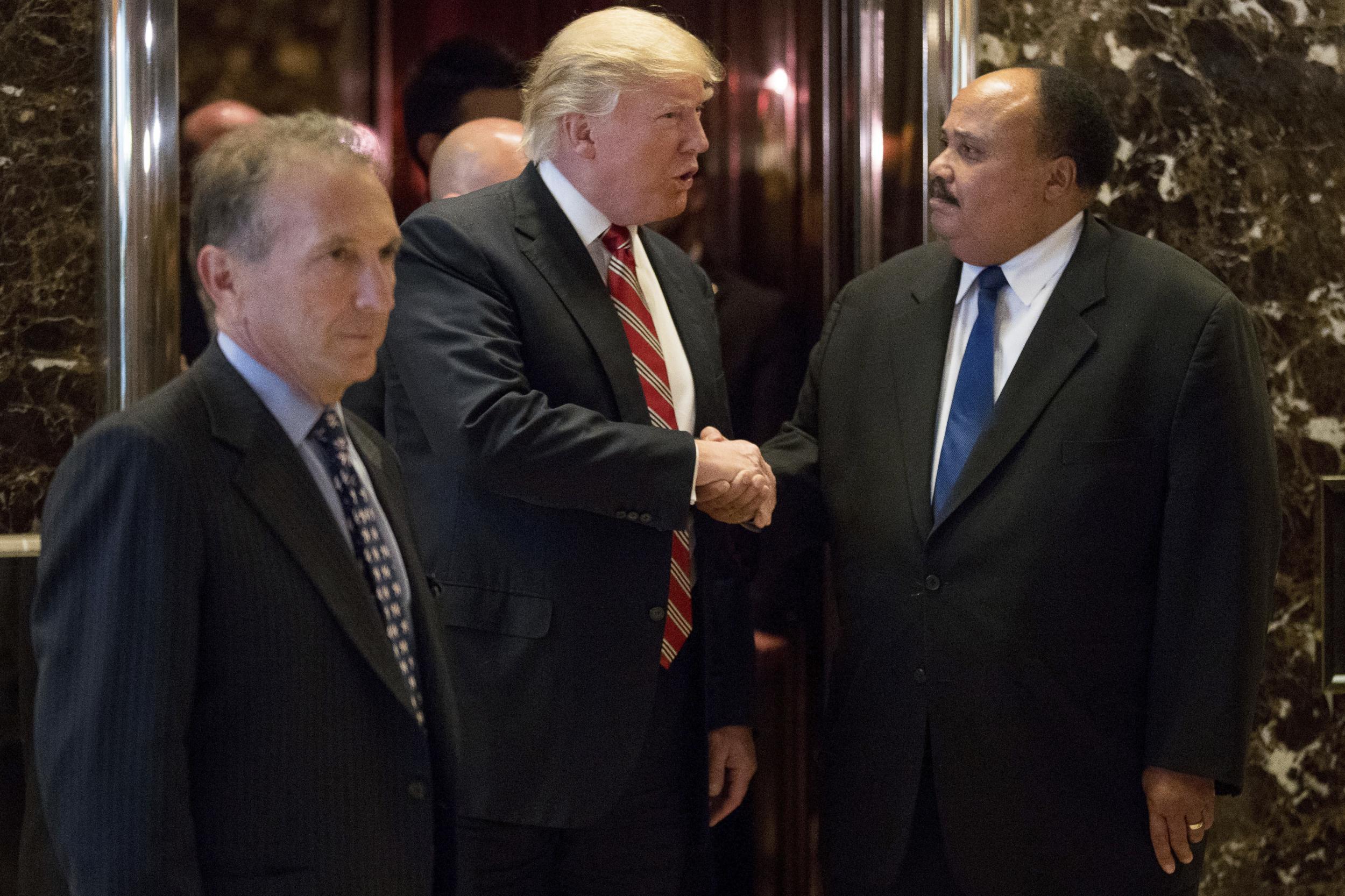Donald Trump meets with Martin Luther King III to discuss voting rights
Mr Trump's meeting came shortly after he dismissed civil rights hero John Lewis and cancelled a trip to the National Museum of African American History and Culture

Your support helps us to tell the story
From reproductive rights to climate change to Big Tech, The Independent is on the ground when the story is developing. Whether it's investigating the financials of Elon Musk's pro-Trump PAC or producing our latest documentary, 'The A Word', which shines a light on the American women fighting for reproductive rights, we know how important it is to parse out the facts from the messaging.
At such a critical moment in US history, we need reporters on the ground. Your donation allows us to keep sending journalists to speak to both sides of the story.
The Independent is trusted by Americans across the entire political spectrum. And unlike many other quality news outlets, we choose not to lock Americans out of our reporting and analysis with paywalls. We believe quality journalism should be available to everyone, paid for by those who can afford it.
Your support makes all the difference.President-elect Donald Trump met the oldest son of Martin Luther King, just days after he slapped down civil rights hero John Lewis for being "all talk, no action".
Martin Luther King III visited Trump Tower on the day that commemorates his father's birthday to discuss voting rights. He arrived shortly before 1pm and was seen walking out less than an hour later.
He told reporters that he, as well as Democratic congressman John Lewis, were "bridge builders" and they would "continue to evaluate" Mr Trump’s pledge to unify the US.
"What my father and mother represented, what I always try to do in my life, was to always bring people together," he said.
The 59-year-old advocate and community activist added that Mr Trump told him during the meeting "over and over" that he would "represent all Americans".
"I believe that’s his intent but we have to consistently engage with public pressure. My father understood that," said Mr King.
Mr King has long campaigned to provide free government photo identification to make it easier for Americans who do not have a driver’s licence or other ID to cast their ballot.
Many Americans cannot open a bank account without a form of government ID.
Asked what his father, the slain civil rights leader, would make of Mr Trump, he replied: "I think my father would be very concerned about the 50 to 60 million people living in poverty.
"With an American multi-trillion dollar economy, it's insanity that we have poor people in this nation. That’s unacceptable. And we know that we can roll up our sleeves and there's nothing we can’t do."
Mr Trump did not speak about the meeting to the press pool at Trump Tower, but his press secretary Sean Spicer announced Mr King's visit earlier that day.
"Today, President-elect Trump is going to sit down with Martin Luther King III and others in New York and have a conversation about voting, about bringing more people into the system, the legacy of Doctor King and how we can continue to pursue that under the Trump administration," Mr Spicer told NBC.
Mr Trump tweeted earlier on Monday that Mr King’s father was a "great man".
The President-elect was heavily criticised for attacking Mr Lewis on social media, however, saying he was "all talk, no action" and he should focus more on his "infested" district. He also cancelled a trip to the National Museum of African American History and Culture, about five hours after saying he would go.
Mr King refuted the claims about Mr Lewis, who has worked for congress since 1986.
"No, absolutely, I would say John Lewis has demonstrated he’s ‘action’," he said. "As I’ve said things get said on both sides in the heat out of emotion. People are literally, probably, dying. How do we feed people? How do we clothe people? That’s what we need to focus on."
In an op-ed in the Washington Post, Mr King III said that Mr Trump won in key states like Pennsylvania, Michigan and Wisconsin where minority turnout was lower than normal.
"While we can’t know how those affected would have voted, we can agree that every citizen should have the unfettered opportunity to vote," he wrote.
"Indeed, my concern is not how people vote, but simply that they vote."
Join our commenting forum
Join thought-provoking conversations, follow other Independent readers and see their replies
Comments